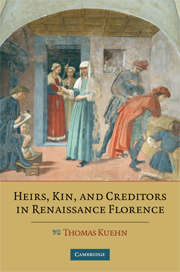“The author of three monographs and a collection of articles, Thomas Kuehn has established himself as a leading authority on the social history of Renaissance Florence. The focus of his research has been the tension between the Italian legal tradition, as interpreted by jurisconsults, and its implementation in practice as it affected individual lives and fortunes. In Heirs, Kin, and Creditors, Kuehn has analyzed Florentine inheritance practices, concentrating specifically on the widespread practice of inheritance repudiation (some 11,000 cases between 1365 and 1534). His exploration of these cases of repudiation testifies ot the obsessive interest of Florentines in the patrimonies they inherited, and often repudiated, and their involvement in the pervasive litigation over the disposition of inherited property. This solidly researched study is a significant contribution to the scholarship on inheritance practices in Renaissance Florence.” -Gene Brucker, emeritus, University of California, Berkeley
“From a wide range of archival sources, Heirs, Kin, and Creditors focuses on the repudiation of inheritance in Renaissance Florence. In so doing, it explores larger questions of credit, commerce, kinship, and the status of women. With new perspectives from legal history, this work demonstrates the importance of patrilineal ideologies and structures in Renaissance Florence against older notions of proto-capitalism and Burckhartian individualism. It presents new paradigms for the legal, family, and economic history of late medieval and early modern Italy.” -Samuel Cohn, University of Glasgow
“Inheritance strategies by heirs is not an oxymoron. Repudiation of inheritance, a legal act by heirs to renounce the rights and duties of property to kin and creditors, provided heirs the means to control and reorder their place in the economic and social structure. Tom Kuehn's study of Florentine repudiations from 1365 to 1534 analyzes the other side of the problems, quarrels, and frauds over inheritance to reveal the tensions over credit and debt, trust and distrust, honesty and deceit in Renaissance Florence. His legal anthropology emphasizes the importance of social relations and networks in establishing the trustworthiness and transparency of exchange, as it explains the enduring centrality of family goals against the so-called ‘modern’ distinctions between family and individual interests.” -John A. Marino, University of California, San Diego
“In his prolific publications Thomas Kuehn has taken delight in exploring the many chinks in the monolith that is the Florentine family. Focusing on an heir's capacity to refuse an inheritance, this work offers a fascinating new understanding of the realities that lay behind the norms of family solidarity. Repudiation should be unthinkable in a family-based society, and yet there were thousands of documented repudiations in Renaissance Florence, exciting commentary and generating copious documentation. Kuehn leads us on a tour of the landscape of repudiation, showing how potential heirs used it to avoid debts, channel inheritances down new paths, and even punish irresponsible family members. We know how law could work to sustain the norms of family life. Heirs, Kin, and Creditors shows how the law could also be used to pull the family apart.” -Daniel Smail, Harvard University
"Kuehn finds from his research in the period's records of repudiation of inheritance that heirs could get out from under a patrimony or exercise a familial or persona strategy by sending the estate on to another." -Reference & Research Book News
"A strength of Kuehn's study is the constant attention paid to the dynamic of family and individual purposes, to the complexities of generational transmission of wealth, and to how family property played into the commercial development of Renaissance Florence." -Susan Mosher Stuard, American Historical Review





